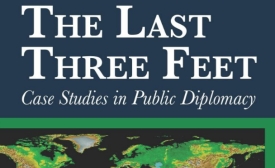cultural exchange
At the opening ceremony, President of the Korea-Vietnam Friendship Association (KOVIFA) Choi Young-joo emphasized that the RoK and Vietnam share many historical and cultural similarities and have made joint efforts to develop prosperous nations and happy people in a peaceful, friendly and cooperative environment.

The USC Center on Public Diplomacy, in partnership with the USC Annenberg Center on Communication Leadership & Policy and the Public Diplomacy Council, was pleased to present a discussion of "
As part of growing business relations and exchanges between Zimbabwe and the United States, eight Zimbabwean local government officials today in Chicago concluded a ten-day visit to three U.S. cities.
Michigan State University student Brisbane Asekome spent her summer serving as a student ambassador at the 2012 World Expo in Yeosu, Korea. As a student ambassador, she was on the front lines of U.S. public diplomacy efforts as the public face of the USA Pavilion 2012.
“The use of sport in local or intra-national diplomacy has proven effective in the case of Tanzania between two formerly conflicting nations, Tanganyika and Zanzibar, with the conduct of sports paving the way towards cultural exchanges, which eventually led to the strengthening of ties between the two liberation movements,” the lawmakers said in their bill.
A cultural, sports and tourism exchange programme between Vietnamese and Lao border provinces will take place from August 16 in Vietnam’s central provinces of Nghe An, Quang Binh and Ha Tinh and Laos’ Xiengkhoang, Bolykhamsay and Khammouan provinces.
Russia is missing out on opportunities to use soft power in Africa, according to experts on the continent. Russian authorities struggle to push "soft power" buttons in an effort to rebrand Russia's image and to regain some social and cultural influences in Africa population, experts say the plan of cultural diplomacy might only be achieved with consistency and to deliver on their promises promptly.







